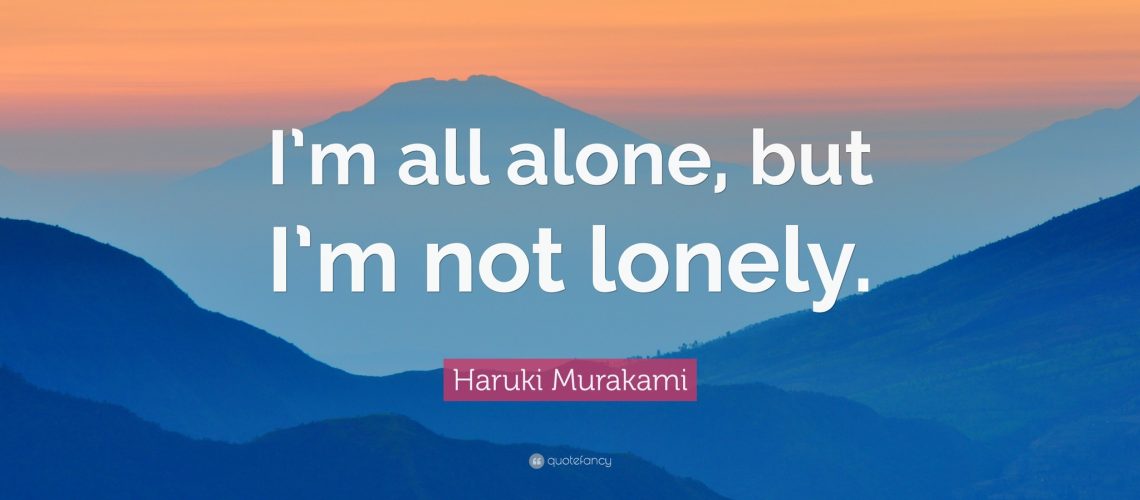 Loneliness is a lack, a feeling that something is missing, a pain, a depression, a need, an incompleteness, an absence. Aloneness is presence, fullness, aliveness, the joy of being, and overflowing love. You are complete. Nobody is needed, you are enough.
Loneliness is a lack, a feeling that something is missing, a pain, a depression, a need, an incompleteness, an absence. Aloneness is presence, fullness, aliveness, the joy of being, and overflowing love. You are complete. Nobody is needed, you are enough.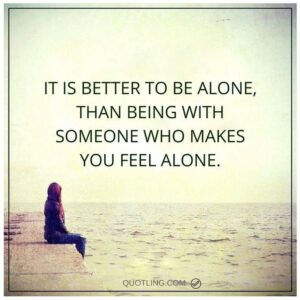
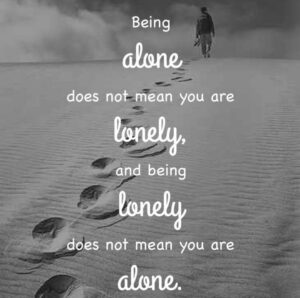 Sometimes we can feel lonely even when we are in company. Ultimately, loneliness is not about how many people you are with, but how connected you feel to those around you. It is possible to be at a crowded party and still feel alone. We can be in our most intimate relationships, and we can often feel lonely, especially if the relationship is going through a rough patch or if it is no longer a ‘working relationship’
Sometimes we can feel lonely even when we are in company. Ultimately, loneliness is not about how many people you are with, but how connected you feel to those around you. It is possible to be at a crowded party and still feel alone. We can be in our most intimate relationships, and we can often feel lonely, especially if the relationship is going through a rough patch or if it is no longer a ‘working relationship’
In fact, The Psychology Department at the University of Chicago has a useful definition for loneliness that shows it is not just about being physically alone. They define the term as “the distress that results from discrepancies between ideal and perceived social relationships.” This means you can have plenty of people in your life but still feel lonely if those people don’t provide the emotional connection you crave. You may have plenty of friends, a long-term partner, a great family, and lots of online connections but you still, feel desperately lonely.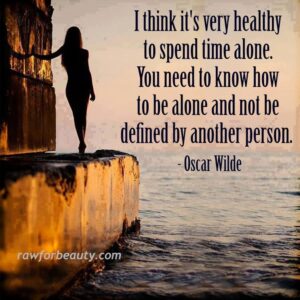
Ultimately, we have a need to feel valued and understood and if that is missing, we can experience a feeling of loneliness whatever our outside circumstances.
Here are six signs your feeling of loneliness is not a lack of friends and connections but the wrong kind of connections for you.
1. The people in your life don’t spend quality time with you
We seem to be in an attention crisis in society at present. We are so busy with work and responsibilities that it is hard to find the time and energy to spend quality time with others.
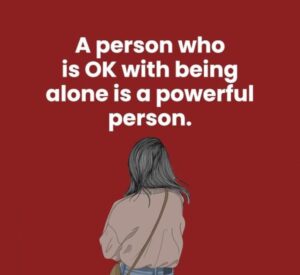 In addition, even when we do spend time with people, they often don’t give
In addition, even when we do spend time with people, they often don’t give
us their full attention. People may spend their time together but also be checking their phones or watching TV and never engaging in a proper conversation. This can lead to a sense of disconnection and leave us feeling the pain of loneliness. Setting some boundaries around technology use can really help overcome this problem. It can also help to make plans for regular dates, family days, and meet-ups with friends.
2. You don’t have anyone to encourage your hopes and dreams
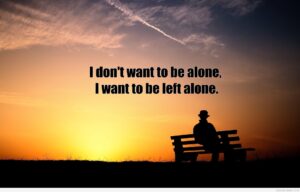 The opposite of loneliness is feeling connected. When we are truly connected to someone, we can share our hopes and dreams with them. Most of us can remember a time when we sat up half the night talking to someone who really ‘got us.’
The opposite of loneliness is feeling connected. When we are truly connected to someone, we can share our hopes and dreams with them. Most of us can remember a time when we sat up half the night talking to someone who really ‘got us.’
When we don’t have people in our lives who make supporting and encouraging our dreams a priority, we can feel isolated and alone. Making time for this type of connection is crucial if we want our relationships to remain healthy.
If no one in your life really gets you, then perhaps you can find a class, group, or club where people share similar dreams to you.
3. You don’t have anyone you could call in a crisis
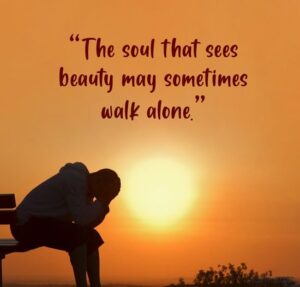 When we experience difficult situations, we often need to talk through our feelings with someone else. In addition, during a crisis, we might need practical help. If you feel that you have no one in life on that you can 100% rely in times of need upon on, this can lead to a sense of isolation, fear, and chronic loneliness.
When we experience difficult situations, we often need to talk through our feelings with someone else. In addition, during a crisis, we might need practical help. If you feel that you have no one in life on that you can 100% rely in times of need upon on, this can lead to a sense of isolation, fear, and chronic loneliness.
In the short term, you might like to consider getting a counselor or life coach until you can find someone who is truly there for you in your time of need.
4. You don’t have anyone in your life who shares your interests
Even if you are surrounded by loving family and friends, you can still feel alone if you don’t have anyone to share your interests with. For example, you may have a sports-mad family, but you would love to spend time watching films or visiting a gallery.
5. The people in your life undermine or criticize you a lot
Many relationship misunderstandings are simply about a lack of thought and communication. However, sometimes, the other person is just not able to meet your needs or give you the encouragement and support you deserve. If you are in a personal relationship with someone who undermines or criticizes you a lot, then this is a damaging relationship and something urgently needs to be done.
Don’t put up with people who do not see how wonderful you are. Get support to find people who recognize all the good in you. If you have a critical boss, friend or colleague, it is harder to avoid them. However, try to remember that their criticism probably comes from their own lack of self-belief/worth and confidence.
Talk to someone within the company about what you are experiencing. Then do your work to the best of your ability and blow them away with your achievements and success. Soon you could be their boss and show them the right way, how to get things done.
6. The people in your life stonewall you
Another symptom of a dysfunctional relationship is when a person refuses to talk to you or walks away for some reason. This may occur after an argument or when they believe you have done something wrong. Again, this is evidence of a damaging relationship and not a behavior that you should put up with.
Calmly ask them to talk about the situation as you would like to understand how they feel. If this doesn’t work you might want to consider couples counseling. If they refuse to work on the problem, it might be time for the relationship to end.
Closing thoughts
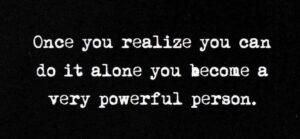 One of the best ways to begin to overcome a feeling of loneliness is to be your own best friend. Do what you love and spend time taking good care of yourself. Self-care is very important because you will be spending the rest of your life with yourself.
One of the best ways to begin to overcome a feeling of loneliness is to be your own best friend. Do what you love and spend time taking good care of yourself. Self-care is very important because you will be spending the rest of your life with yourself.
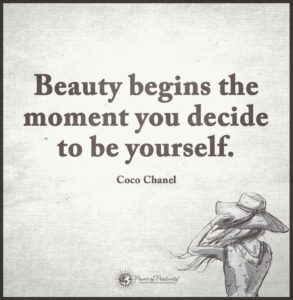 Bear in mind that we often have expectations of relationships that don’t match with those we want to be with. For example, you might come from a family who thinks it is important to talk every day when they are apart. But perhaps your partner’s family talks less frequently. This may make you feel rejected when your partner doesn’t phone every day when he or she is away from home. Talking about your expectations of a relationship can really help clear up these kinds of misunderstandings.
Bear in mind that we often have expectations of relationships that don’t match with those we want to be with. For example, you might come from a family who thinks it is important to talk every day when they are apart. But perhaps your partner’s family talks less frequently. This may make you feel rejected when your partner doesn’t phone every day when he or she is away from home. Talking about your expectations of a relationship can really help clear up these kinds of misunderstandings.
Be aware of your own assumptions, too. You may assume that a friend who doesn’t contact you in a while no longer wants to be your friend when actually they might just be crazy busy or dealing with a crisis of their own.
Of course, you should never stay in a relationship where you are being emotionally or physically abused. If you suspect that you are in this kind of relationship, you should seek support and advice as soon as possible.
